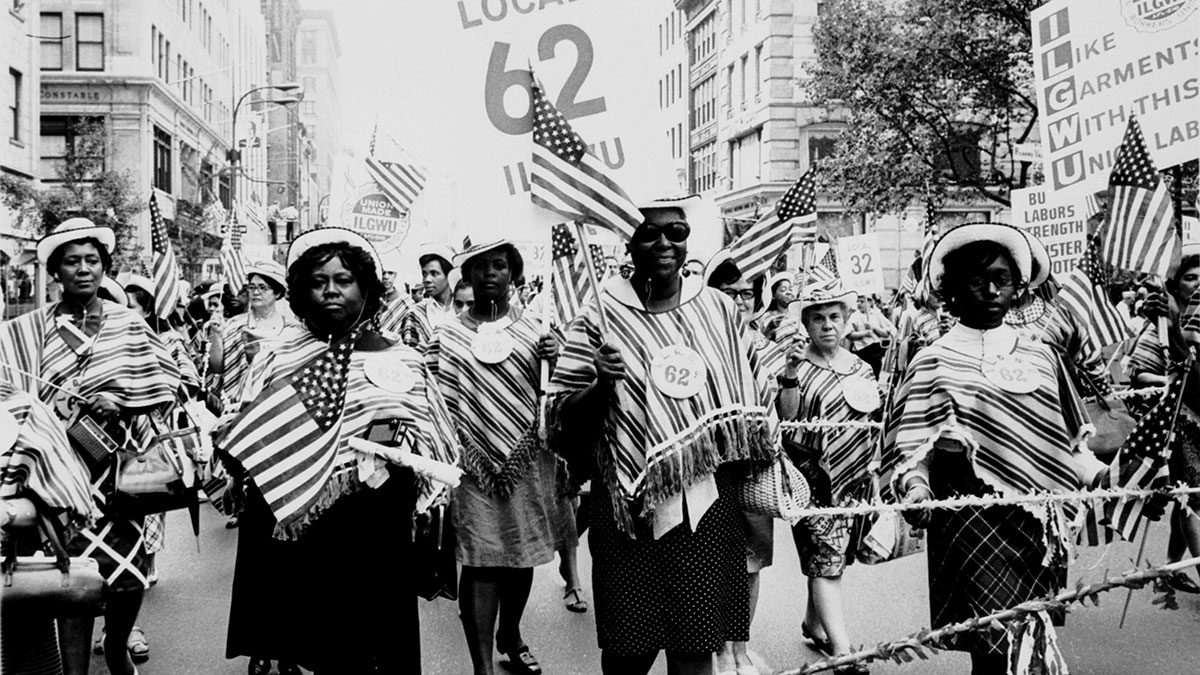Alan Johnstone
Why do the United States and Canada commemorate Labor Day on the first Monday in September and not, as in many other countries, on the first of May?
Some workers, unaware of the history, view Labor Day as a tactic to counteract the militant international working-class spirit of May Day, as a symbol of workers’ docility and collaboration with the bosses. It is a day associated with BBQs, picnics and shopping at the mall. However, Labor Day is a celebration of America’s and Canada’s labor movement. That’s easy to forget these days.
Labor Day took its inspiration from a strike for the 8 hour day held in Toronto in the 1870sand was adopted by American workers, four years before the momentous events of 1886 that initiated May Day. So both Labor Day and May Day share common origins in the campaign for “8 hours of work, 8 hours of rest and 8 hours for what we will” as the song went.
So both Mayday and Labor Day should be reminders of the need for working people to try and capture the good things in life and advance working peoples’ well-being. Labor Day also came about because workers felt they were spending too many hours and days on the job. In the 1830s, manufacturing workers were putting in 70-hour weeks on average. Sixty years later, in 1890, hours of work had dropped, although the average manufacturing worker still toiled in a factory 60 hours a week. These long working hours caused many union organizers to focus on winning a shorter eight-hour workday. They also focused on getting workers more days off, such as the Labor Day holiday, and reducing the working week to just six days. Labor unions are still finding ways to wield their organizing influence and help fellow workers.
The World Socialist Movement tries to explain the lessons of the first Mayday and Labor Day is that the capitalists need us, we do not need them. “Labor creates all wealth, All wealth belongs to labor”. Our fellow workers need to learn and understand the truth of that statement.
In capitalism, the rich always grow richer and all workers can do within capitalism is slow that process down. What is needed is the entire edifice, the whole system – wages, profits, markets requires abolishing and only then can we make decisions to free ourselves and the world.
Canadians will, of course, be fully aware that their Labor Day origins can be traced back to an 1872 printers strike in Toronto when a parade was staged in support of the Toronto Typographical Union’s strike for a 58-hour work-week. Police arrested 24 leaders of the Typographical Union. Labour leaders decided to call for a demonstration on September 3 to protest the arrests. The Toronto Trades and Labour Council began to hold similar celebrations every spring. American Peter J. McGuire, the co-founder of the American Federation of Labor, was asked to speak at a labour festival in Toronto, Canada on July 22, 1882. Returning to the United States, McGuire and the Knights of Labor organised a similar parade based on the Canadian event on September 5, 1882.
In the 1800s, unions covered only a small fraction of workers and were relatively weak. The goal of organizations like the Central Labor Union and more modern-day counterparts was to bring many small unions together to become more powerful. The organizers of the first Labor Day were interested in creating an event that brought different types of workers together to meet each other and recognize their common interests. Unions increase the bargaining power of workers, which translates into higher earnings and a stronger voice for employees.
But like so many workers’ initiatives, Labor Day was co-opted by the government and by the employers. It became a federal holiday in 1894, when, following the murder of workers during the Pullman Strike, in an attempt to appease the nation’s workers, President Grover Cleveland fearing further conflict, rushed legislation through Congress to designate the first Monday in September Labor Day. The Cleveland Administration believed it would act as a counterweight to May Day, the international day of labor solidarity adopted by the First Congress of the Second Socialist International in 1889 to commemorate the Haymarket Massacre in Chicago in 1886 so from its outset Labor Day symbolized the official American labor movement’s commitment to a more moderate form of politics! May Day emphasized the fact that the working class had to fight for its right to organize and for all the gains it had won in wages, hours and conditions of work. It was to counteract the militant working-class spirit of its marching legions on May Day that the government set aside the first Monday in September as a labor holiday. The American Labor Day holiday came as a “gift” that the workers received from their masters, through their servile politicians.
Labor Day must not become a symbol of workers’ docility, of collaboration with the bosses, of everything that weakens and hurts the working class. It cannot be a day when politicians and employers advertise and promote themselves. Every shrewd politician will pose as a “friend of labor”, shaking hands and jovially slapping the labor union leaders on the back (later to stab them in the back), seeking to secure their endorsement and election donations with a lot of empty promises and false hopes before setting off the legislatures on the labor vote, promptly forgetting the pledges until next election rolls around.
The reformists have kept socialist politics out of the trade union movement, while capitalist politics have run amok undoing the strength of the unions.
Many working people now vote against their economic interests. Unions have donated more than millions to pro-business politicians.
“Unions fail partly from the injudicious use of their powers,” wrote Marx. The World Socialist Movement does not shy away from warning our fellow workers what pitfalls are in store for them if they persist in giving their time, money and votes to parties that can only work in the interests of their masters. It is time that cash was directed at more worthwhile causes such as organizing the non-unionized.
On Labor Day we must expose that great falsehood the slogan of “a fair day’s wage for a fair day’s work.” Since wages imply exploitation and represent but a minor fraction of the total product of labor, it is self-evident that wages can never be fair. Wages grow out of a system of unfairness, of robbery. Accordingly, for labor to acknowledge that there is such a thing as a “fair wage” is to kowtow to the principle of exploitation, to kiss the hand that robs it and impresses on the mind of labor the “duty” to deliver its goods—its ability to produce—to the master joyfully and to the fullest capacity. It puts on the worker, by his own consent, the brand of the slave.
The history of the North American movement is rich in the tradition of the importance of unions to workers. The struggles waged and the gains won by workers demonstrate what can be achieved through organizing on the economic field. We have the unions to thank for a lot of things we take for granted: the eight-hour workday, child labor laws, health and safety standards and the weekend. And studies show that a large union presence in an industry or region can raise wages even for non-union workers. But as weak and ineffectual as the labor movement is today, it is still a potential threat.
The history of the labor movement proves the Marxian contention that wages are not regulated by any “iron law” but can be modified by organized militant action on the part of the workers. The necessity of native-born and foreign workers; black, hispanic and white, to march together on picket lines, to work together in strike committees and hold out together until their demands are won – all this constitutes an object lesson in class solidarity that American and Canadian workers must learn and practice.
It is time that Labor Day 2021 brings home the point: There is a need for a change in our society. Socialism is a necessity. It would destroy the capitalist system wherein one class is enriched by exploiting the majority. We need socialism because the means of life, the factories, mines, transport, communications and land should belong to the people! We need socialism because the production of the necessities of life would be for the use of the people instead of the profit of a few. The capitalist world heaps misery upon misery upon the backs of the toilers. Capitalism remains what it has been from birth: a system of exploitation of the many for the enrichment of the few. Labor Day should remind us of the urgency to move towards socialism. The capitalist world heaps misery upon misery upon the backs of the toilers. Capitalism remains what it has been from birth: a system of exploitation of the many for the enrichment of the few. Labor Day should remind us of the urgency to move towards socialism.
We are all one—all workers of all lands and climes. We know not color, nor creed, nor gender in the workers’ movement. We know only that that with the solidarity of labor, we will vanquish wage-slavery and humanize the World. But when all is said and done, the workers won’t get much from this annual love-fest of Labor Day messages and speeches. Government is dismissive at all levels to the interests of the working class. The monied alone are served. The only solution is a revolutionary change.
So please remember that this holiday was paid for with union sweat and on occasions with union blood.
Workers of the world, unite! You have nothing to lose but your chains! You have a world to gain!



